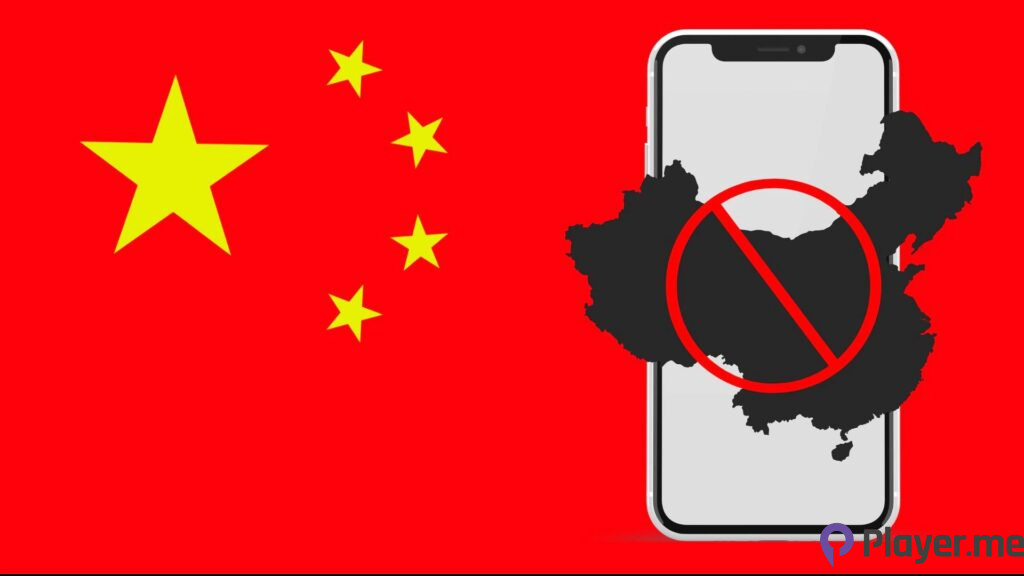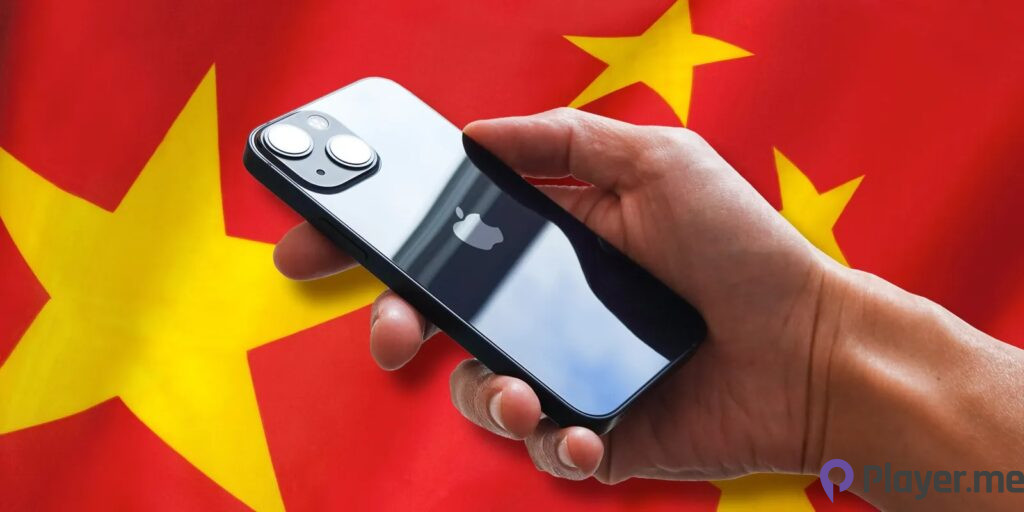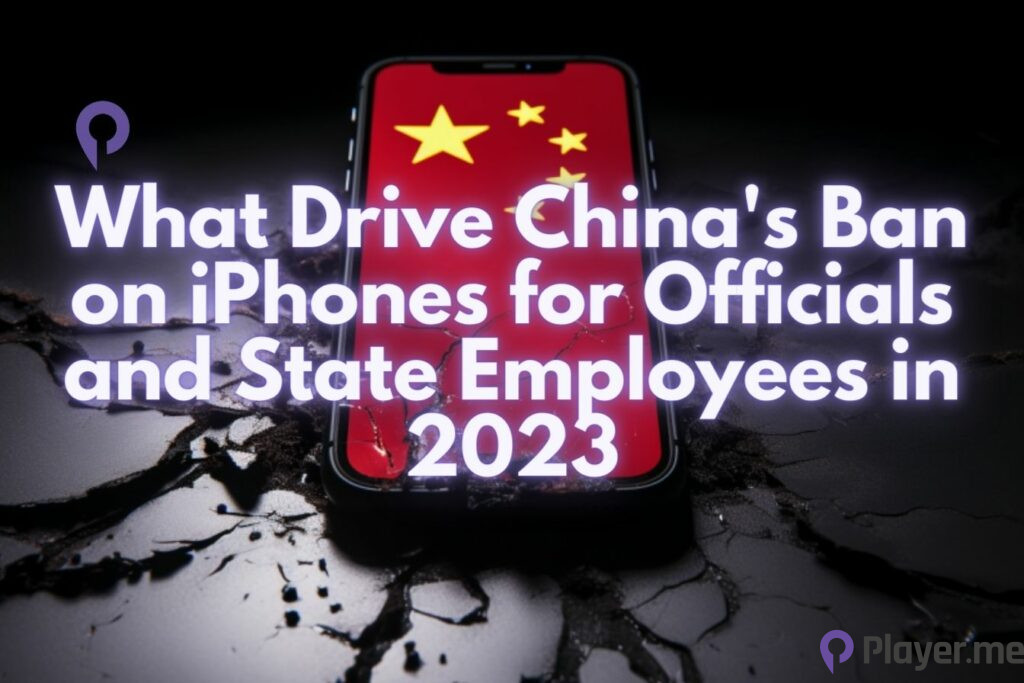In a recent turn of events, China’s ban on iPhones for government officials, employees at state-owned enterprises, government-backed agencies, and state companies from using iPhones. This unannounced move shrouded in secrecy, comes amidst the backdrop of the ongoing trade and tech war between Washington and Beijing. While the ban may seem surprising, it reflects China’s efforts to reduce its reliance on foreign technology and enhance cybersecurity.

This article explores the reasons behind China’s ban iPhones and the implications it holds for the tech industry and international relations.
The Motivation Behind China’s Ban on iPhones

China’s ban on iPhones for government officials and employees aligns with its broader strategy to decrease dependence on foreign technology and support domestic companies like Huawei. The recent launch of Huawei’s Mate 60 Pro, a smartphone competing directly with the iPhone, adds an intriguing element to the timing of this ban. Bank of America has noted the curious coincidence of the iPhone ban with the Mate 60 Pro’s release.
Timely Competition: Huawei’s Mate 60 Pro
Chim Lee, a China analyst with the Economist Intelligence Unit, explains that China’s ban on iPhones is consistent with China’s commitment to bolstering cybersecurity. iPhones could potentially access local networks and collect environmental data, raising concerns about data security. While China has been striving to enhance cybersecurity since at least 2016 through new laws and regulations, technological limitations have previously hindered these efforts. Recent advancements may have provided China with the confidence to proceed with these cybersecurity measures.
Strengthening Cybersecurity Measures
Moreover, China and the United States both view each other’s tech companies as potential security risks that could offer backdoor access to sensitive data and government infrastructure. The ban on Chinese-owned TikTok in several U.S. states and restrictions on doing business with Chinese tech firms, including Huawei, highlight the reciprocal nature of these concerns.
Also Read: Sneak Peek to 13 Exciting iOS 17 Features You Must Know
The Ongoing U.S.-China Tech Rivalry

The release of the Mate 60 Pro, powered by the advanced Kirin 9000s processor, has raised questions about the effectiveness of export controls imposed by the U.S. government. National Security Adviser Jake Sullivan has expressed the need for a closer examination of the smartphone to ascertain whether the law has been circumvented, underscoring the complexities of regulating the tech industry in an interconnected world.
Conclusion
China’s ban on iPhones for government officials, state employees, and government-affiliated organisations reflects its commitment to cybersecurity and reducing reliance on foreign technology, coinciding with the competitive launch of Huawei’s Mate 60 Pro. Amidst the ongoing U.S.-China trade and tech rivalry, these actions underscore the broader narrative of economic and technological decoupling between nations prioritising national security. As the world watches, this move serves as a stark reminder of evolving dynamics in international relations and the pivotal role of technology in shaping them. Do you have thoughts that you want to share with us? Do let us know on Facebook, Instagram, and Twitter.
Frequently Asked Questions
Why Has China’s Ban on iPhones for Government Officials and Employees?
China’s ban on iPhones decision is to prohibit government officials and state employees from being rooted in the country’s broader strategic goals. It is part of China’s comprehensive effort to reduce its reliance on foreign technology companies and bolster its domestic tech industry. This ban is driven by concerns over national security and the potential risks associated with foreign-made devices, which could access sensitive local networks and collect environmental data. As China has been actively working on improving its cybersecurity infrastructure, this move aligns with the government’s commitment to safeguarding its digital landscape.
How Does Huawei’s Mate 60 Pro Relate to This Ban?
China’s ban on iPhones comes at a time when Huawei, a prominent Chinese tech company, has launched its Mate 60 Pro smartphone. This smartphone has garnered significant attention due to its competitive features and advanced Kirin 9000s processor. Some experts suggest that the ban on iPhones could be strategically linked to the competitive challenge posed by Huawei’s new device. The timing raises questions about whether China aims to promote its own domestic tech products while limiting the use of foreign alternatives.
What Are the Broader Implications of This Ban on the Tech Industry and International Relations?
Beyond its immediate impact on individual device choices, China’s ban on iPhones symbolises a deeper divide within the global tech landscape. It highlights the ongoing trade and tech rivalry between China and the United States, where both nations view each other’s tech companies as potential security risks. This move adds to the narrative of economic and technological decoupling between these two major powers, as they increasingly prioritise national security over economic ties. It also raises concerns about the future of global tech cooperation and competition, as well as the regulatory challenges that arise in an interconnected world. The implications of this ban extend beyond the realm of smartphones, resonating in international relations and shaping the course of technological development worldwide.





